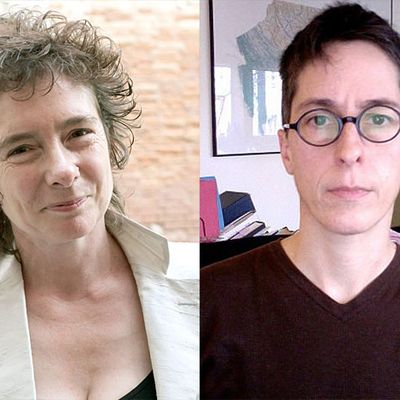
What has the publishing industry put in the water? This spring heralds the arrival of not one but two memoirs by prominent lesbian writers: Jeanette Winterson’s Why Be Happy When You Could Be Normal? and Alison Bechdel’s Are You My Mother?
In this week’s issue of the magazine, I write about those memoirs and about my own formative first encounter with Winterson’s coming-out novel, Oranges Are Not the Only Fruit. That was back when I was coming out myself, and queer literature was a revelation: taboo yet affirming, illicit yet requisite, totally comforting, totally hot. At the time, I couldn’t get enough of it. Almost twenty years later, as I settled down with the Winterson and Bechdel memoirs, I realized something startling: I couldn’t remember the last time I’d read a coming-out story, or even anything specifically queer.
What happened?
For one thing, I changed. Somewhere along the line, I stopped needing to see my sexual orientation reflected in the books I read, even though I continue to believe such cultural visibility is important. In Are You My Mother? Bechdel quotes Adrienne Rich, the fearless, fearsome lesbian feminist poet who died last week:
“I naturally absorbed ideas about women, sexuality, power from the subjectivity of male poets. … The dissonance between these images and the daily events of my own life demanded a constant footwork of imagination, a kind of perpetual translation, and an unconscious fragmentation of identity: woman from poet.”
I understand that. I agree with that. And I believe that the western canon as conventionally construed — i.e., conventionally — impoverishes everyone. Still, not long after I came out, I came to terms with another fact about myself: I friggin’ love the western canon. I have, as it turns out, the literary tastes of Harold Bloom. (Not exclusively those tastes, to be sure. I will eat my hat if Bloom relished, say, Sarah Waters’s Tipping the Velvet, as I do, but still.)
In Why Be Happy, Winterson argues that, “Reading things that are relevant to the facts of your life is of limited value.” That claim makes me nervous, because it’s easily used to make the case for a narrower rather than a broader literary culture. (I think of it as the “We Are All Holden Caulfield!” defense, which is even more likely than Radclyffe Hall’s The Well of Loneliness to make me want to throw myself out a window.) Yet I know what Winterson means. I still thrill to moments of identification while reading, but identification, like identity, is a many-splendored thing. These days, I read for a different kind of rapport: for the moment when a writer, regardless of era, origin, or identity, expresses an experience with such precision that it illuminates or enlarges my own life. That moment of recognition — ah, you too? — strikes me, now, as literature’s most radical possibility.
***
Still, if I changed, so did the culture at large. The first panel of Dykes to Watch Out For — Bechdel’s unfailingly astute lesbian comic strip — came out in 1983. Oranges came out in 1985. I came out in 1993. All of that was pre-Ellen, pre-DADT, pre-post-DADT, pre-gay-marriage, pre–Rachel Maddow, definitely pre-hot-lesbian-cop-on–The Wire. The eighties and nineties were hardly the worst decades in U.S. history to be queer, but the years that followed brought swift improvements in everything from laws and policies to cultural representations. Society recapitulates ontogeny, apparently: It Got Better.
Inevitably, those changes in queer culture also changed queer literature. The coming-out story might be to the late twentieth century what the marriage plot was to Victorian times: a story line made relevant by social conventions, often repressive ones — and then, as those conventions eroded, made irrelevant again. (Of course, the culture changed in part because of those stories; in effect, the storytellers put themselves out of business. “When all of a sudden the New Yorker starts running these blasé post-gay cartoons,” Bechdel writes, “I feel like, Fuck! What have I been doing with my life?”) Queer people still narrate their experience of coming out, obviously; but as a genre, at least in serious adult literature, the coming-out story appears to be on the wane.
Certainly, neither Are You My Mother? nor Why Be Happy qualifies as a coming out story. Twenty years ago, both Bechdel and Winterson were telling stories whose content, readership, and reception were profoundly influenced by the fact that they were lesbians. I’m the last person on earth to lament the presence of lesbians in literature, as both characters and authors. Still, it’s a pleasure to return to these writers and find them telling what might be called post-coming-out stories: books where the interrogation of selfhood ranges so far beyond being queer that it arrives at simply being. How did I become who I am? How do we account for something as complex and mysterious as selfhood? What is a “self,” anyway?
These, clearly, are questions for all of us. There’s a passage in Bechdel’s memoir where her mother is complaining about confessional poetry. “Who cares?” she asks, of the poet’s life. “It’s too specific.” Bechdel challenges her: “Can’t you be more universal by being specific?” Her mother doesn’t answer that question. These memoirs do: you can.
Related: Two Lesbian Literary Titans Take on their Greatest Demon: Mom [NYM]




